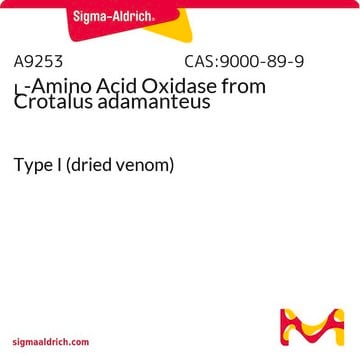F7296
Fructosyl-Amino Acid Oxidase from Corynebacterium sp.
recombinant, expressed in E. coli, lyophilized powder, ≥0.45 units/mg protein
Se connecterpour consulter vos tarifs contractuels et ceux de votre entreprise/organisme
About This Item
Numéro de classification (Commission des enzymes):
1.5.3.x
Numéro CE :
Numéro MDL:
Code UNSPSC :
12352204
Nomenclature NACRES :
NA.54
Produits recommandés
Produit recombinant
expressed in E. coli
Forme
lyophilized powder
Activité spécifique
≥0.45 units/mg protein
Poids mol.
~88 kDa by electrophoresis
Température de stockage
−20°C
Description générale
Fructosyl amino acid oxidase [fructosyl-a-l-amino acid:oxygen oxidoreductase] is a flavoprotein that catalyzes the oxidation of fructosyl amino acids to form glucosone, amino acid and hydrogen peroxide.
Enzyme Commission (E.C.) 1.5.3.x
Application
Fructosyl-Amino Acid Oxidase from Corynebacterium sp has been used in glycated haemoglobin HbA1c detection in blood samples using quartz crystal microbalance (QCM) based detection.
Fructosyl-amino acid oxidase can be used to detect the levels of glycated proteins, which are markers for diabetes mellitus.
Actions biochimiques/physiologiques
Fructosamines are formed when glucose is condensed amino group of amino acids or proteins. Fructosamine oxidases (FAOX) catalyze the oxidative deglycation of low molecular weight fructosamines. Fructosyl amino acid oxidase catalyzes the oxidation of the C-N bond linking the C1 of the fructosyl moiety and the nitrogen of the amino group of fructosyl amino acids.
Fructosyl-Amino Acid Oxidase (FAOD) comprises of FAD-binding motifs and is classified into three types based on substrate specificity. The engineered Corynebacterium Fructosyl-Amino Acid Oxidase is stable at 45°C and could be exploited for the development of glycated protein biosensing system and glycated hemoglobin HbA1c measurements. FAOD shares sequence homology with fructosyl peptide oxidase and both are effective on α-fructosyl substrates.
Suitable for the determination of fructosyl-L-amino acid.
Définition de l'unité
One unit will produce 1.0 μmole of hydrogen peroxide per minute at pH 8.0 at 37 °C.
Code de la classe de stockage
11 - Combustible Solids
Classe de danger pour l'eau (WGK)
WGK 3
Point d'éclair (°F)
Not applicable
Point d'éclair (°C)
Not applicable
Équipement de protection individuelle
Eyeshields, Gloves, type N95 (US)
Certificats d'analyse (COA)
Recherchez un Certificats d'analyse (COA) en saisissant le numéro de lot du produit. Les numéros de lot figurent sur l'étiquette du produit après les mots "Lot" ou "Batch".
Déjà en possession de ce produit ?
Retrouvez la documentation relative aux produits que vous avez récemment achetés dans la Bibliothèque de documents.
Les clients ont également consulté
R Romero Campos et al.
Angiologia, 43(3), 130-131 (1991-05-01)
Authors report the case of a young man affected by an aneurysm at the humeral artery. The relevance of this case was due to its notable rare incidence at such level as well as its difficult etiologic diagnosis. Patient was
C Gerhardinger et al.
The Journal of biological chemistry, 270(1), 218-224 (1995-01-06)
A Pseudomonas sp. soil strain, selected for its ability to grow on epsilon-(1-deoxyfructosyl) aminocaproic acid, was induced to express a membrane-bound enzymatic activity which oxidatively degrades Amadori products into free fructosamine. Apparent Km values for fructosyl aminocaproate, epsilon-fructosyl lysine, fructosyl
Structural basis of the substrate specificity of the FPOD/FAOD family revealed by fructosyl peptide oxidase from Eupenicillium terrenum
Gan W, et al.
Acta Crystallographica. Section F, Structural Biology Communications, 71(4), 381-387 (2015)
A quartz crystal microbalance-based biosensor for enzymatic detection of hemoglobin A1c in whole blood
Park HJ and Lee SS
Sensors and Actuators B, Chemical, 258, 836-840 (2018)
S A Schellini et al.
Acta ophthalmologica, 67(5), 601-604 (1989-10-01)
The authors report a case of fibrohistiocytoma of the limbus and discuss the clinical, histopathological and immunohistochemical findings concerning this type of lesion, with a comparison of their findings with those reported in the literature.
Notre équipe de scientifiques dispose d'une expérience dans tous les secteurs de la recherche, notamment en sciences de la vie, science des matériaux, synthèse chimique, chromatographie, analyse et dans de nombreux autres domaines..
Contacter notre Service technique










